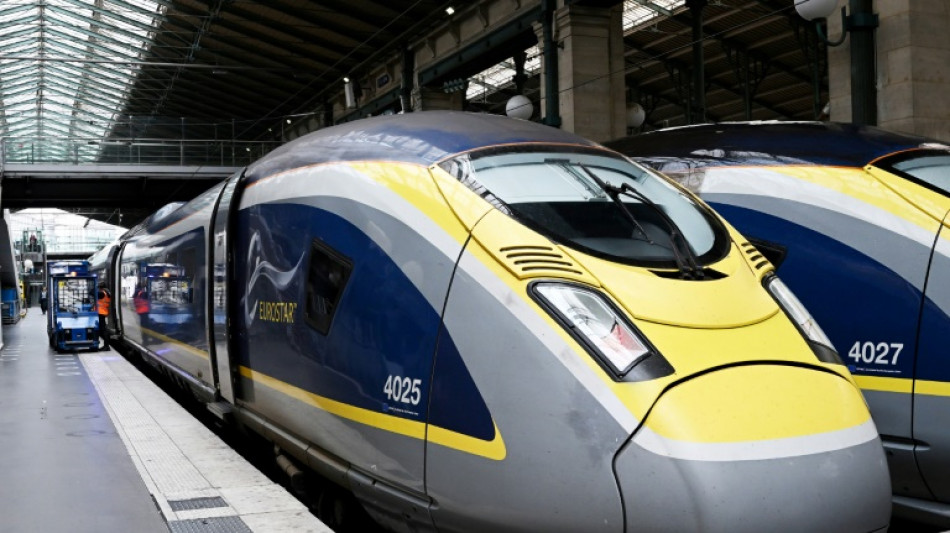

Passengers snub 'expensive' London-Paris Eurostar train for plane
Many travellers are opting to take a plane rather than train between London and Paris despite climate concerns and the Eurostar rail service connecting the two capitals in just over two hours.
"It's ridiculous to take the plane for such a distance," said Sabia Mokeddem, a French national who has lived in London for more than five years.
Mokeddem says she is forced to fly, however, because of Eurostar's "prohibitive" ticket prices for the 305-mile (492-kilometre) high-speed link through the Channel Tunnel.
"I think of all the carbon that I'm emitting for such a short flight... But I can't afford the train," the 27-year-old bank worker told AFP.
She says she would happily pay a little more to let the train take the strain "because it's better for the planet" and because she prefers going by rail.
But the difference in price is too great when she can find flights that go over rather than under the Channel for as little as 40 euros ($43).
Lucy Kelly, a 30-year-old from Ireland who lives in Paris and works in brand management, takes the train to London only when she can reserve a seat well in advance.
"If I'm organised enough I'll book the Eurostar," she explained. "Then you can find a return for 110 euros which is fine, I think, even if it's still more expensive than the plane.
"If I go last minute, prices can be crazy."
A return ticket often exceeds 350 euros.
Kelly said she took the plane to London in November.
"It was definitely cheaper -- a quarter of the price of getting on the train," she said.
Getting to the airport was a headache, she admitted, but said she would still probably do it again.
"The train should be subsidised. People should be encouraged to take the train, not the plane," she added.
- Border controls -
When asked by AFP, Eurostar declined to provide the price of an average ticket or indicate whether it had increased in recent years, as many travellers suspect.
The subsidiary of French rail operator SNCF says it cannot compare train and air fares, as flying incurs extra costs such as getting to the airport and for luggage.
Despite evidence of passengers choosing to fly for cost reasons, Eurostar said some seven million people still used its service between London and Paris last year.
In comparison, nearly two million flew in the 12 months to October 2023, according to aviation sector analysts Cirium. Both figures are similar to pre-pandemic levels.
Eurostar commercial director Francois le Doze said people "buy Eurostar first" and trains fill up quicker than planes, which may account for the faster increase in prices.
He also said Parisians and Londoners had greater purchasing power compared with people in other capitals across the continent, which means that "these journeys are priced at the amount people are willing to pay".
"Take-up rates are higher than ever," he insisted.
The company had said it wants to increase passenger numbers, which could help cut prices, but it said that has become more difficult since Britain's departure from the European Union, with Brexit causing a "bottleneck" at the border.
Operating costs for running stations, infrastructure, rail lines, energy, personnel and financing are also "very high", le Doze added.
- Competition -
Environmental campaign group Greenpeace is very active on the issue of high rail prices compared with aviation.
"Government have created an uneven regulatory playing field that benefits the most polluting modes of transport," it said.
"We should tax air travel at a level that reflects the damage it does to the climate."
Greenpeace notes in particular that airlines do not pay tax on aviation fuel.
According to the group, planes emit on average five times more greenhouse gases than trains. Eurostar estimates that there are 90 percent less CO2 emissions on the train.
But it is not just Eurostar where the question of price is an issue: it costs twice as much to travel between London and Edinburgh by train compared with flying, Greenpeace says.
Competition could shake up the status quo for Eurostar passengers fed up with high prices.
The Getlink group, which operates the Channel Tunnel, believes that passenger traffic could at least double from its current levels.
Since the line opened in 1994, there has been talk of Eurostar facing competition from other operators but so far none of the plans has come to fruition.
曾-M.Zēng--THT-士蔑報




